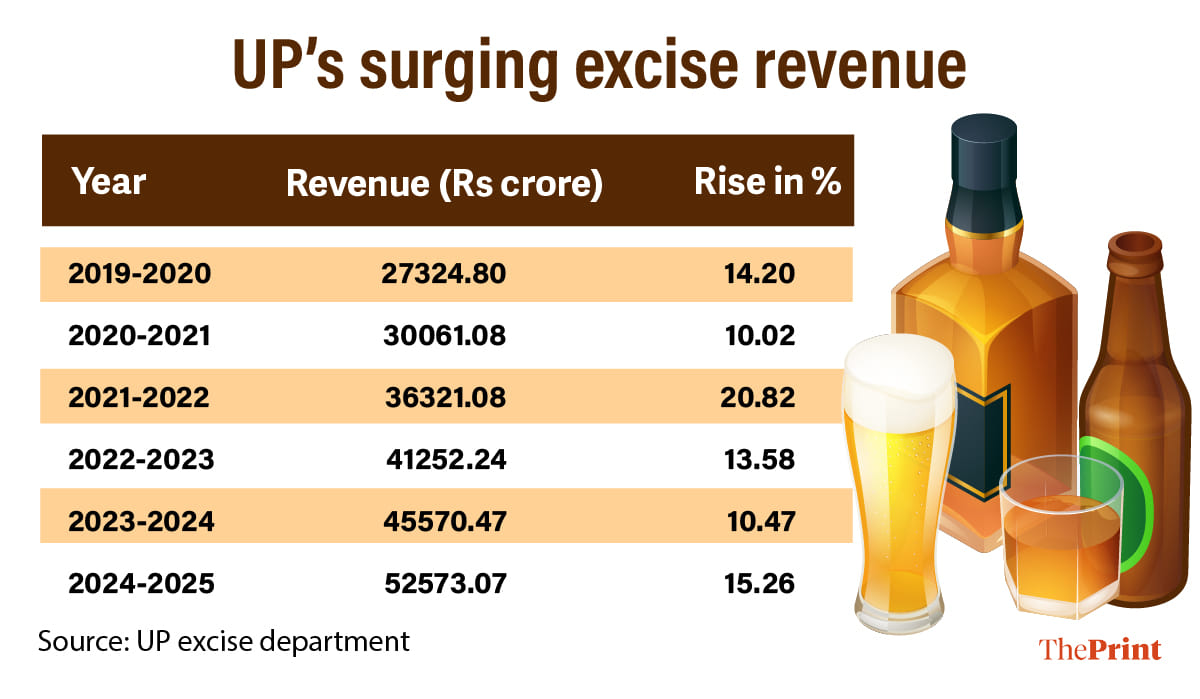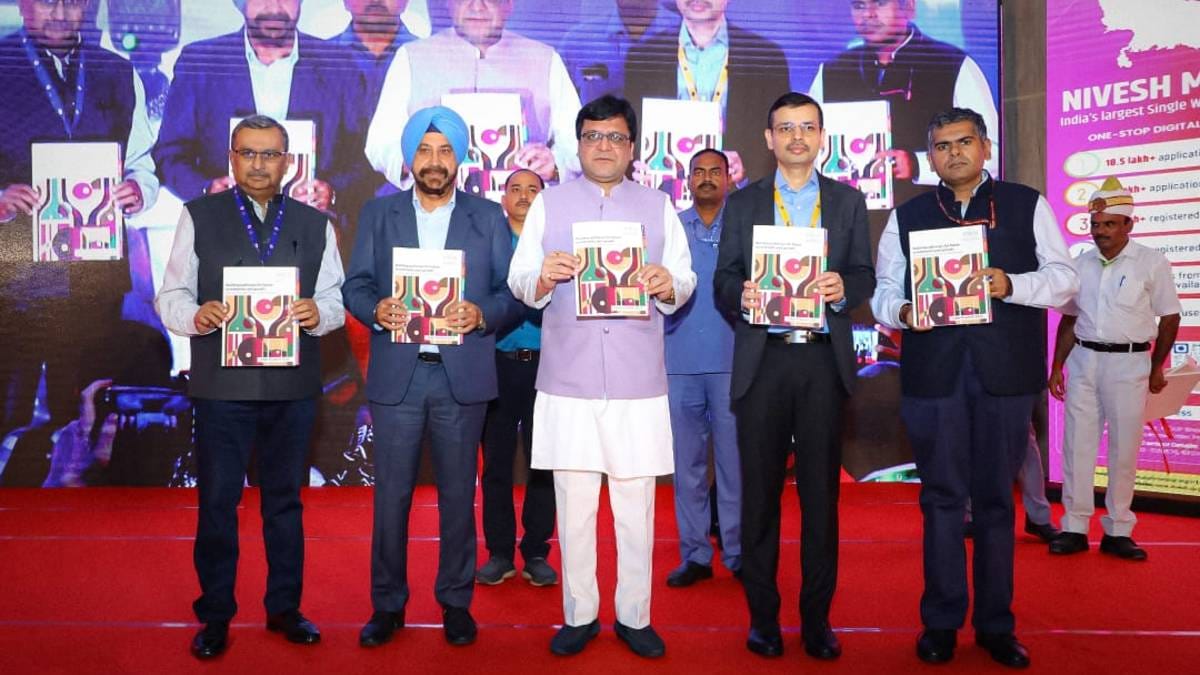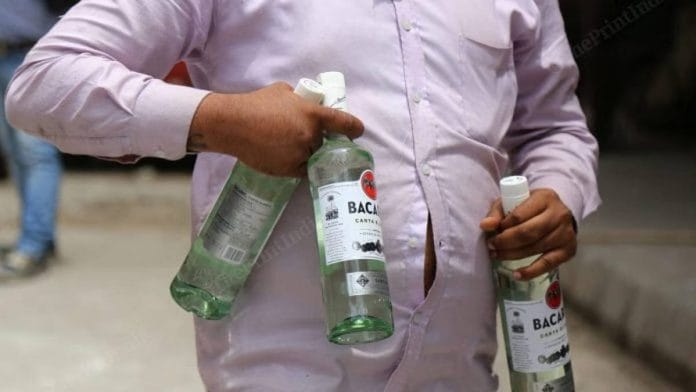Lucknow: Uttar Pradesh is rapidly positioning itself as a prime destination for liquor manufacturing and investment. This was evident at the state excise department’s first-ever investor summit, dedicated exclusively to the alcohol industry, which attracted investment proposals worth Rs 4,320 crore.
According to the excise department, 15 companies gave investment proposals at the summit Wednesday for production of liquor, beer, wine, and alcohol in the state. They will start their units in 15 different districts, including Gorakhpur, Lucknow, and Mathura.
State government officials said the one-day summit, held in capital Lucknow, was aimed at boosting investment in the alcohol sector, including production, distribution, and marketing, along with other related industries. The event was also meant to showcase a business-friendly policy environment and provide investors with key policy insights.
Data from the excise department accessed by ThePrint shows that over the past seven fiscal years, it has witnessed a significant surge in revenue and more than doubled its collections. In 2018-2019 fiscal, the department’s revenue stood at Rs 23,927.56 crore, which has now crossed Rs 52,573.07 crore.

Alongside revenue growth, liquor production in the state has also seen a dramatic increase. In 2018, UP was producing 62.95 crore litres of liquor. By April 2025, this figure jumped three-fold to over 182.6 crore litres.
Speaking to ThePrint at the summit, excise minister Nitin Agarwal said that UP is steadily emerging as a manufacturing hub for alcohol.
He added that in recent years, the state has received 142 investment proposals for alcohol-based industries through the Invest UP portal. These led to the signing of 135 MoUs worth Rs 39,479 crore, and are expected to generate over 73,000 jobs.

Of these, 46 projects have completed land acquisition and are ready to begin work, representing a total committed investment of Rs 7,888 crore. So far, 19 units have become operational, attracting Rs 2,339 crore in investment and providing employment to 2,316 people, he said.
Speaking to ThePrint Saturday, Agarwal cited three main reasons behind the rise in interest of investors in the state: Change in excise policies in the past few years, end of monopoly of some businessmen and improved law & order under Chief Minister Yogi Adityanath since 2017.
Also Read: India is witnessing a ‘gin-surgence’ propelled by ‘eager to experiment’ consumers & brands
Policy measures over the years
According to officials in the excise department, in 2018, the Uttar Pradesh government took a major step to end the nearly decade-long monopoly of some businessmen in getting liquor licences.
As part of the reforms, the state abolished the special licence zone for Meerut and replaced it with a uniform excise structure applicable across all districts. To curb misuse, the government banned wholesale shop licences and introduced online applications, restricting individuals/businesses to a maximum of two licences, they said.
Sanjay Bhoosreddy, retired IAS officer and former additional chief secretary, sugar industry and excise, said the “phase between 2018 and 2023 was an overhaul in the policies of the excise department to break down decades-long monopoly of big investors”.
“Earlier, liquor industrialists (Chadhas, Jaiswals, etc) were considered big giants in liquor production and manufacturing in UP but as we changed policies in 2018-19 and 2019-20, smaller businessmen also entered it,” he told ThePrint.
“In 2018-19, we restricted individuals/businesses to a maximum of two licenses per district and four in the state. Then in 2019-20, we restricted individuals to a maximum of one license per district and two in the state,” he added.
He highlighted that to attract investments and boost the income of farmers, the excise department in March 2022 introduced the concept of “made in UP” wine. No excise duty is levied over the beverages that are produced using local fruits.
Some officials also credit certain major decisions for driving revenue growth.
“In July 2020, a cabinet decision allowed the sale of premium quality liquor and beer from shopping malls, and the excise department also set a licence fee. The annual licence fee for such shops has been fixed at Rs 12 lakh and it can be obtained by any individual, company, firm or society. This decision has helped in changing perception regarding wine sales in UP,” a senior official in the excise department told ThePrint.
“Now there are liquor shops in at least 50 malls of Uttar Pradesh. Another noticeable change is that women now prefer purchasing liquor from shops located in malls. We’ve observed this shift, and made access to liquor more convenient for them,” the official said.
On 1 April this year, UP’s new Excise Policy 2025-2026 came into effect with several significant changes. One was the introduction of an e-lottery system for allotting liquor shops in the state, aimed at increasing transparency and fairness in the licensing process.
For the first time, the government also launched the concept of “composite shops”, combining separate outlets for beer and Indian Made Foreign Liquor (IMFL) into a single unit to simplify retail operations. In terms of product packaging, 90 ml bottles will be available in the regular foreign liquor category, while both 60 ml and 90 ml options will be offered in the premium segment.
A report released at the summit by International Spirits and Wines Association of India highlighted that the state’s alcoholic beverages industry generated Rs 56,000 crore in market revenue in fiscal 2023-2024 and contributed 2.4 percent to state GDP.
According to the report, alcohol sales account for 25 percent of the state’s tax revenue. The IMFL segment has also seen annual volume growth of 10 percent, driven by increasing demand for premium products.
It further said that 80 percent of the state’s container glass production is consumed by the beverage industry. The state currently has 27,308 licensed liquor retail outlets, which collectively employ over 1.3 lakh workers.
Also Read: Cancer warning on liquor bottles ‘long overdue’. Even ‘light’, ‘moderate’ drinking poses threat
CM’s eye on alcohol sector
CM Adityanath rarely refers to excise revenue figures in his public addresses, but officials close to him told ThePrint that he closely monitors the numbers as part of his broader ambition to make the state a one-trillion-dollar economy.
According to senior officials in the Chief Minister’s Office, meetings with Adityanath can be tricky for the excise department, particularly when it comes to discussing liquor-related matters.
“We try to avoid using the word ‘liquor’ as much as possible,” said a senior official, speaking on the condition of anonymity. “Yogiji doesn’t like the term and he reacts visibly whenever it’s mentioned,” the official added.
Despite the discomfort with terminology, officials in the excise department said the CM has granted them a free hand to reform the sector. “It was CM Yogi who insisted on cracking down on liquor smuggling. That’s how the track-and-trace system came into being,” said a second official in the UP excise department.
Agarwal too highlighted at the investor summit that under Adityanath’s leadership over the past eight years, the revenue of excise department had surged, and urged both new and existing investors to contribute towards UP becoming a one-trillion-dollar economy.
“Investor enthusiasm reflects growing confidence in UP’s business environment. We have created an ecosystem that supports industrial growth and ease of doing business,” he asserted.
Excise commissioner Adarsh Singh, meanwhile, emphasised the importance of stakeholder engagement, assuring that key industry suggestions would be considered in the formulation of next year’s excise policy.
Fruit winery
Uttar Pradesh’s liquor industry also has strong agricultural links, with more than 3.4 lakh farmers supplying grain and sugarcane for alcohol production.
In a bid to promote innovation and rural entrepreneurship, the state has announced five-year excise duty exemption on wines produced from locally grown fruits. The move is seen as a significant push to enhance fruit cultivation and support agri-based entrepreneurial ventures across the state.
UP’s first fruit winery producing alcoholic beverages from mangoes and a variety of locally grown fruits was also opened last month in Lucknow’s Malihabad division.
Set up inside a 100-acre mango orchard, the facility has been developed at a cost of nearly Rs 10 crore and was established by Lucknow-based horticulturalist Madhavendra Deo Singh, a native of the Mal region. He had signed an MoU with the state horticulture department at an investors’ summit held in 2023.
Madhvendra told ThePrint that wines will be available for purchase directly at the winery, and guided day tours for visitors will begin in about two months. “We are producing wine using fruits that are locally available in Uttar Pradesh. We are not using grapes. For mead, we’re using multi-flower and mustard honey sourced from Katarnia Ghat,” he said.
“Our mead is crafted from mango, mulberry, and mint, and the alcohol is naturally derived—it isn’t created through artificial fermentation. We also do not add ethanol to any of our products.”
He said the first batch of four wine products was ready for launch, all made exclusively from fruits grown by farmers in the Mal and Malihabad region. Priced between Rs 300 and Rs 1,200, they will be available in multiple sizes.
Singh said a unique hybrid beverage called “braggot” had also been developed blending the characteristics of both beer and mead.
At Wednesday’s investor summit, Superior Industries Limited announced a Rs 74 crore winery expansion project.
“We signed an MoU with the government and plan to scale up production. The single-window clearance system has made the entire process seamless; we completed all formalities online without visiting any government office. This is the change we felt in Uttar Pradesh,” Managing Director Manish Agarwal said.
(Edited by Nida Fatima Siddiqui)
Also Read: Smoking, alcohol & high BMI among biggest risk factors linked to cancer death, says Lancet study






